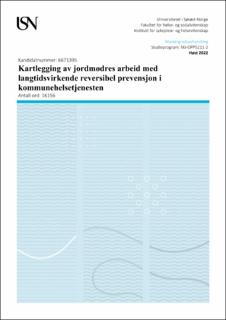| dc.contributor.advisor | Myhre, Enid | |
| dc.contributor.advisor | Lukasse, Mirjam | |
| dc.contributor.author | Raaen, Marianne | |
| dc.date.accessioned | 2023-02-10T17:41:34Z | |
| dc.date.available | 2023-02-10T17:41:34Z | |
| dc.date.issued | 2022 | |
| dc.identifier | no.usn:wiseflow:6671395:52022203 | |
| dc.identifier.uri | https://hdl.handle.net/11250/3050117 | |
| dc.description.abstract | Bakgrunn: Jordmødre i Norge har i 20 år hatt rekvireringsrett for p-piller. Utvidet rekvireringsrett og administrasjon av langtidsvirkende reversibel prevensjon (Long acting reversible contraception- LARC) kom relativt nylig i 2016. Det finnes ingen norske studier som beskriver den kommunale jordmortjenestens arbeid med LARC i Norge.
Hensikt: Hensikten med studien er å kartlegge kommunejordmødres arbeid med prevensjonsveiledning og administrasjon av LARC.
Metode: Studien er en deskriptiv tverrsnittsstudie der data ble samlet inn via et elektronisk anonymisert spørreskjema. Utvalget i denne studien var jordmødre i kommunehelsetjeneste i Norge. Spørreskjemaet ble sendt ut via åpne Facebook grupper for kommunejordmødre i Norge.
Resultat: Av jordmødrene i utvalget tilbyr 8 av 10 administrasjon av LARC, ytterligere 1 av 10 gir tilbudet til sårbare og risikoutsatte kvinner. Av de deltagende jordmødrene tilbyr 9 av 10 prevensjonsveiledning. Størst tilbud ble gitt til barselkvinner på etterkontroll, deretter kvinner på Helsestasjon for ungdom (HFU) og til sårbare og risikoutsatte kvinner.
Konklusjon: Studien viser at tilgjengelighet og kompetanse i jordmortjenesten fremstår som viktige faktorer for å oppnå myndighetenes mål om prevensjonsveiledning og administrasjon av LARC. Den viser nedslående tall for antall jordmødre med praktiske kompetansekrav, bare 45 (39,8%) har dette, fokus bør rettes mot nødvendig opplæring av jordmødre. For å øke tilbudet og gi alle kvinner mulighet, må kommunene øke tilgjengeligheten i tjenestene, både ved helsestasjoner og HFU. | |
| dc.description.abstract | Background: Midwives in Norway have had the authorization to prescribe birth control pills for the last 20 years. Extended authorization of prescribing and administering of long-acting reversible contraception (LARC) came relatively recently in 2016. There are no Norwegian studies that describe the municipal midwifery service's work with LARC in Norway.
Purpose: The purpose of the study is to describe municipal midwives' work with contraceptive guidance and administration of LARC.
Method: The study is a descriptive cross-sectional study in which data were collected via an electronically anonymized questionnaire. The sample, in this study, were midwives in municipal health services in Norway. The questionnaire was sent out through open Facebook groups for municipal midwives in Norway.
Results: 8 out of 10 of the midwives in the study offer administration of LARC, and another 1 out of 10 offers it only to vulnerable and at-risk women. Of all participating midwives, 9 out of 10 offer birth control. The offer is primarily to postpartum women. The second largest group were women at health centers for young people (Helsestasjon for ungdom (HFU)) and to vulnerable and at-risk women.
Conclusion: The study shows that availability and competence in the midwifery service stand out as important factors in achieving the authorities' goals regarding contraceptive guidance and administration of LARC. It shows discouraging figures for the number of midwives with practical competence requirements. Only 45 out of 113 possess it (39,8%), and the focus should be on the necessary training of midwives. In order to increase the offer and give all women the opportunity, the municipalities must increase the availability of services, both at health centers and HFU. | |
| dc.language | nob | |
| dc.publisher | University of South-Eastern Norway | |
| dc.title | Kartlegging av jordmødres arbeid med langtidsvirkende reversibel prevensjon i kommunehelsetjenesten | |
| dc.type | Master thesis | |
